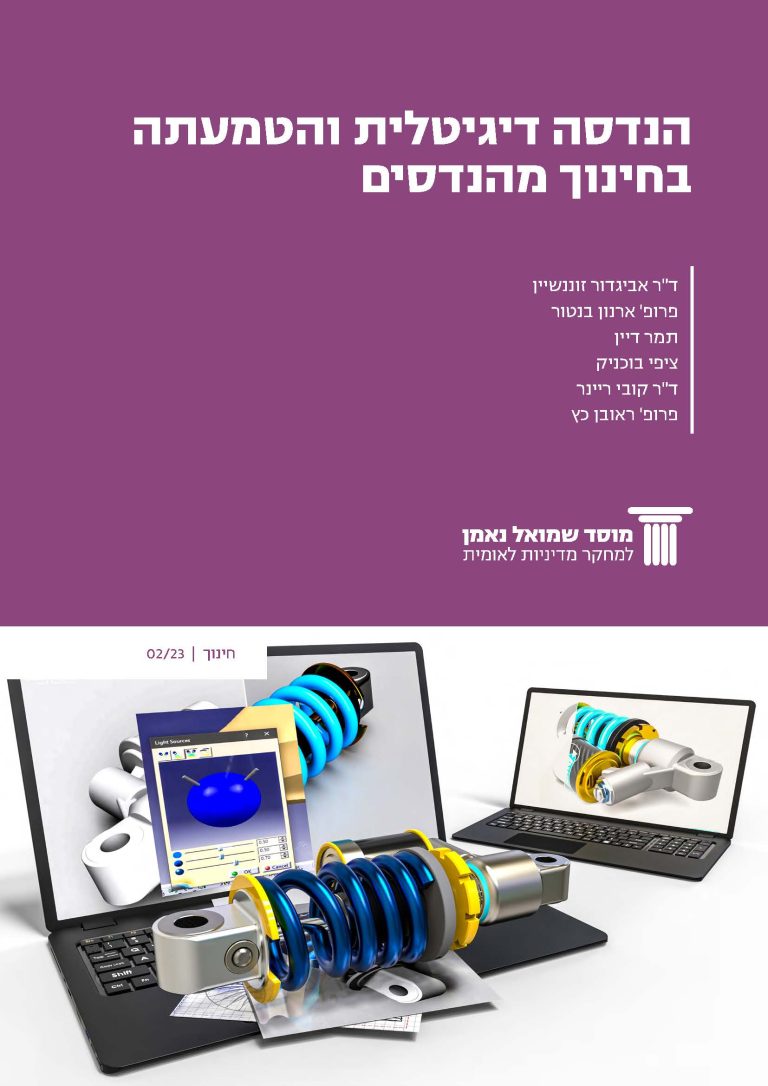המהפכה התעשייתית הרביעית המתרגשת עלינו בשני העשורים האחרונים, כוללת בתוכה מספר מגמות חשובות, שאחת מהן היא המהפכה הדיגיטלית או כפי שהיא מכונה הטרנספורמציה הדיגיטלית.
במסמך זה אנו מציגים היבטים מגוונים של הטרנספורמציה הדיגיטלית, עם דגש על מרכיביה ומשמעויותיה להנדסה דיגיטלית, שהיא הטרנספורמציה הדיגיטלית של ההנדסה בתחומים השונים. ההיבטים השונים של הנדסה דיגיטלית כוללים בין השאר היבטים אסטרטגיים. יישום הנדסה דיגיטלית בארגונים הוא מהלך אסטרטגי וארגונים וחברות מובילות בעולם גיבשו תכנית אסטרטגית לקידום ויישום הנדסה דיגיטלית (כמו: משרד ההגנה האמריקאי, חברות רכב ותעופה מובילות).
זוהו מטרות, אתגרים, הזדמנויות ומכשולים ביישום אפקטיבי של הנדסה דיגיטלית והוערכו התועלות המשמעותיות. התועלות המהותיות כוללות שיפור איכות מוצרים ומערכות המפותחות בחברות, חיסכון מהותי בעלויות וקיצור משמעותי בלוחות זמנים בפיתוח מערכות, ייצורן, תחזוקתן ואספקתן. מידע זה מאפשר ומסייע לארגונים, מנהלים ומהנדסים לגבש תכנית אסטרטגית ליישום הנדסה דיגיטלית בתחומי אחריותם. תכנית זו אמורה לענות בצורה מובהקת על האתגרים של הארגון בהיבטים שיווקיים, טכנולוגיים ,הנדסיים ותהליכיים.
יישום תכנית זו צפויה לשנות לטובה באופן מהותי את התהליכים בהם מיושמת ההנדסה ונגזרותיה בארגונים ופרויקטים אלו.
פורום חינוך מהנדסים למאה ה-21 המתקיים ומונהג, במוסד שמואל נאמן, מקדם יישום והטמעת הנדסה דיגיטלית ואוריינות דיגיטלית באקדמיה ובתעשייה בישראל. מסמך זה מהווה חלק מתשתית הידע למאמצים אלו.בהמשך לגיבוש האסטרטגיה ליישום הנדסה דיגיטלית, פיתוח וקידום הנדסה דיגיטלית מחייבת חינוך והכשרה למנהלים, למהנדסים ולכל סגל העובדים המקצועי העוסק בפיתוח, בהנדסה, בייצור, בתחזוקה ובאספקה של המערכות המורכבות.בדו”ח זה מתוארות תכניות קיימות בארץ ובעולם באקדמיה להכשרת דור המהנדסים העתידי לעידן ההנדסה הדיגיטלית, והענקת כישורים דיגיטליים. כמו כן, מתוארות תכניות חינוך לאורך החיים עבור סגל העובדים הקיים כדי לשדרג אותם לעידן החדש. גם התעשייה יוזמת תכניות חינוך והכשרה לאוריינות דיגיטלית והנדסה דיגיטלית לסגל העובדים הקיים, כשדרוג הכרחי של הידע של העובדים. הארגונים (אקדמיה או מגזר עסקי) המתכננים הכשרה בתחומי הנדסה דיגיטלית יכולים ללמוד מהתכניות האלו להכשרה להנדסה דיגיטלית.במסגרת עבודה זו יזמנו וביצענו סקר אוריינות דיגיטלית להערכת הפערים הקיימים במיומנויות הדיגיטליות באקדמיה, בתעשייה ובמגזר העסקי.
ממצאי ותובנות הסקר נכללים במסמך זה. התובנות המרכזיות מסקר זה הן:
- בקרב רוב אנשי התעשייה הובע הצורך שהמהנדסים יהיו בעלי מיומנויות דיגיטליות מגוונות כדי שיתרמו לתהליכי ההנדסה המודרניים. במצב הנוכחי יש פער בין הרצוי והמצוי בתחום ופער זה על פי הערכותיהם ילך ויגדל.
- בקרב רוב אנשי האקדמיה הובע הצורך להכליל יותר לימודי מיומנויות דיגיטליות בתכניות לימודי ההנדסה, כדי להכין את הסטודנטים לעולם העבודה הדיגיטלי המתפתח ומשתנה. אבל עדיין קצב שילוב תכנים דיגיטליים בתכניות הלימודים הוא איטי ולא מספק את הצרכים.
בדו”ח זה גם סקירה של שיטות נבחרות בהנדסה דיגיטלית, כמו: תכן ג’נרטיבי, תכן להדפסות תלת ממד, הנדסת מערכות מבוססת מודלים, הנדסה מבוססת נתונים ודאטה, ותאום דיגיטלי. כמו כן, מתואר יישום הנדסה דיגיטלית בתחומים נבחרים, כמו: יצור מתקדם ותעשיה 4.0, תחזוקה חזויה וניטור בריאות מבנים, אינטרנט של הדברים, הנדסת איכות 4.0, תכן קונספטואלי מבוסס מודלים, שילוב בינה מלאכותית ולמידת מכונה בהנדסה דיגיטלית.












